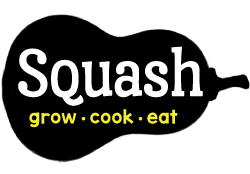It’s time for some garden seed company reviews. If you want to grow great squash, you need some great squash seeds. This site is all about squash. As a result, these seed company reviews and profiles look through a lens of squash seed shopping.
But really, if a company is trying hard to source and preserve interesting or productive or the latest squash varieties, it’s probably doing the same for other vegetables, flowers, and herbs. These companies tend to be best bets across your entire garden! Sadly, the reverse isn’t always true: I have left out a few of my (generally) favorite seed companies if they didn’t have much especially interesting or deep in the squash department.
Note: prices mentioned on this page were correct at the time of posting, winter 2020/21. If you are browsing here in a later year — Hello future people! — the prices will have changed, of course. Happy shopping!
18 Garden Seed Company Reviews to Come
There are so many interesting seed companies that are all a little different, in size, focus, price, and presentation. I know the seed industry pretty well, and I considered about 90 different vegetable garden seed companies for these posts. In the end I narrowed it down to 18 seed companies I’d like to highlight for you. So, this will be a series of three posts. Each time I’ll try to offer a mix of big, medium, and small companies. Update: Post 2 and 3 are now up. After you look through these, check out six more company profiles at Seed Companies: Buy From the Best, Part 2 and the final six at: 18 Seed Companies for Squash Seeds and Other Vegetable Garden Seeds: The Big List.

Johnny’s Selected Seeds
Johnny’s Selected Seeds is a Maine-based, full-range vegetable, flower, farm seed, and supply company with a wonderful history of vegetable and flower breeding and sales. Organic and conventional lines are offered for the most popular vegetables including squashes. It is one of the larger companies on this list, with annual sales around $40 million. This dwarfs some companies I’ll highlight, but big is relative. Johnny’s would need 10 times its sales to hit the bottom of the list of the 20 largest vegetables seed companies.
I could not make a list of squash seed companies and omit Johnny’s, due to their strong history as breeders. Johnny’s breeding team, with hands-on contribution from founder Rob Johnston, Jr., is responsible for some of the iconic American vegetable variety developments of the last 50 years. AAS, or All-America Selections, is an award given by an independent body of peers who judge the greatest vegetable and flower varieties released annually. At least three AAS-winning squashes were bred at Johnny’s research farm.
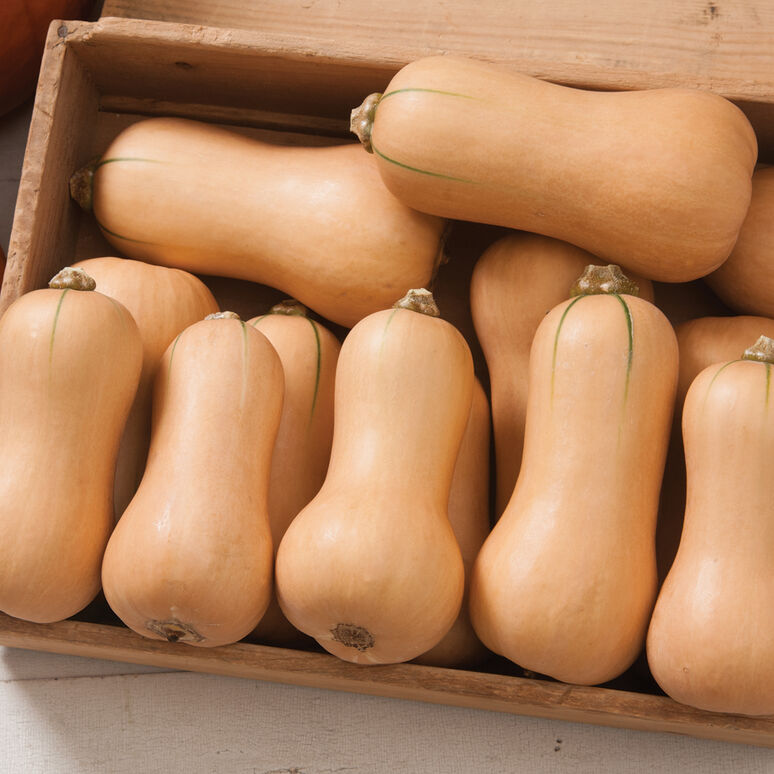
Johnny’s is great for buying seed in bulk. Johnny’s supplies home gardens, small farms, and commercial farms, so you can choose from a wide range of package sizes. While there is solid value at every size due to Johnny’s esteemed quality, the better value is with the bigger packets. Johnny’s is clearly pricing their smallest home garden-sized packets so as to say: “home gardeners aren’t the core of our business model, but we can offer seed this way if you make it worth the effort.”
Let’s consider your range of package size options for squash. You can buy hybrids like ‘Sunshine,’ an AAS-winning scarlet-colored kabocha at sizes from one home garden packet (30 seeds) for $5.50, to 100,000 seeds for $5,709. You can also read Rob Johnston’s account of breeding ‘Sunshine’ right on the web page. You can buy open-pollinated types like organic delicata for $4.95 per packet (30 seeds), up to $363 for 5 pounds. Good ol’ yellow crookneck squash (organic seed) is $4.95 per packet and $315 for 25,000 seeds.
This pricing pattern is typical of the seed industry, and as a smart consumer, there are some things you can consider. First, note that hybrid seed in bulk quantities is priced per seed, while open-pollinated seed is priced by weight. This is because many farmers who use hybrid seed rely on precise cost and profit calculations and precision planting equipment. Then, note the massive price break that occurs with volume. Running a few examples, hybrids cost you about a third as much moving from the smallest quantity purchase to the largest. Open-pollinated types cost you about one seventeeth as much. Here’s a chart that lays it out.
| Squash Variety | Smallest Pkg. Size, Seed Count, Price | Price Per Seed | Largest Pkg. Size and Seed Count | Price Per Seed |
| Sunshine F1 Squash Seed | Packet: 30 Seeds, $5.50 | 0.18 | 100,000 seeds, $5,709 | 0.06 |
| Organic Delicata Squash Seed | Packet: 30 Seeds, $4.95 | 0.17 | 5 lb.= 39,000 seeds, $363 | 0.01 |
| Organic Yellow Crookneck Squash Seed | Packet: 30 seeds, $4.95 | 0.17 | 25,000 seeds, $315 | 0.01 |
This type of massive price break at volume is typical and reasonable in the seed industry and in fact most industries. The labor and material expense to move out 800 individual packets to homes all over North America is simply huge. Sending the same amount of seed in a big sack to a single customer gives a massive price break. The break isn’t as strong with hybrids simply because the seed is so much more expensive to produce.
Summary: Choose Johnny’s Selected Seeds for their range of packaging sizes and for dependability that the pro growers count on: attention to quality in seed sourcing, seed production and testing, and variety selection for the catalog.

Kitazawa Seed Co.
Kitazawa Seed Co. is a wonderful part of American agricultural history. I first learned about Kitizawa as a source of affordable bulk seed when I led Seed Programs International. But it’s also a fun and rewarding source of small packets for home gardens, many of which you just can’t find anywhere else.
Kitazawa’s history reflects the history of our country both bright and dark: it’s a story of a century of immigrant-led success; it’s also a story of destruction and rebirth at the hands of government-led discrimination. Gijiu Kitizawa, and apprentice seedsman in his native Japan, started the company as a storefront in downtown San Jose, California, in 1917. Kitizawa sold both Asian vegetable seed and more widely-known seed from the beginning. The company was an essential supplier for for Japanese-American farmers and other farmers throughout the west. This was during an era when Asian-Americans became an essential part of the West’s economic growth—across industries such as fishing, farming, railroads, and commerce.
But from 1942-1945, the company shut down when Americans of Japanese descent, per FDR’s order, were rounded up and put in harsh, prison-like internment camps. I don’t know the Kitazawas’ story in detail, but many of the 120,000 interned Japanese Americans (citizens and not) returned after the war to find their property seized due to non-payment of taxes.
Today, Kitazawa Seed is again a core provider of seed for interesting vegetable varieties, not only from Japan but across Asia and at times other continents. The entire Kitazawa Seed selection is wonderful to consider in your garden, and squash seed is no exception. Packets tend to run about $4. Consider these examples:
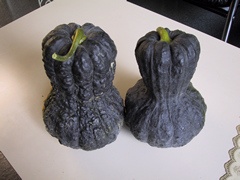
- Shishigetani is an hourglass shaped, warty kabocha type cooked by Buddhist priests.
- Calabaza de Castilla is a classic calabaza type, popular in Latin America and known as West Indian Pumpkin in parts of the Caribbean.
- A wide range of kabocha squash seed is offered. Many seed catalogs only give one to choose from.
- Teot Bat Put is a Korean summer squash variety I’ve never tried, sometimes called “avocado squash” for its distinctive shape.
Dig a little deeper on the Kitazawa website and you’ll find some well designed features. There’s a set of collections, priced to include 7 seed packets each, and focused on a specific cuisine or culinary purpose: Indian food, Korean food, edible flowers, juicing, pickles, macrobiotic cooking, and so on. There’s a special collaborative effort to preserve Asian heirloom varieties. Finally, don’t neglect to click on the leafy vegetables subheading, which opens up a wonderful world in which Asian plant breeders have sailed past anything we’ve achieved here in the west. The array of flavors, shapes, and purposes is astounding.
Summary: Choose Kitazawa Seed Co. to enjoy a truly American historical treasure, enjoy a range of squash seed types you just can’t find anywhere else, and/or to up your game in cooking garden-to-table Asian cuisine.
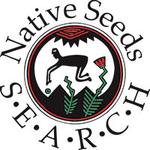
Native Seeds/SEARCH
Native Seeds is a company and seed collection like no other. At its heart, this non-profit organization is, in their words, “a collector and preserver of endangered traditional seeds from communities in the Southwest.” They operate a seed bank with 2,000 varieties specific to traditional and current agriculture in a region ranging from southern Colorado to northern Mexico.
Anybody can buy some seeds from this company, and you’ll find interesting varieties that are fun and redeeming to try in your home garden. If you are in an arid (dry) environment you may find these seed types especially well adapted. Due to limited supply and wishing to prioritize regional food security, Native Seeds offers a portion of their collection only to Native Americans, for free or for a reduced cost. There are additional programs to support community gardens, farmers, and seed saving activities.
2021 features a small but unique squash collection for purchase by the general public. Among others, these include:
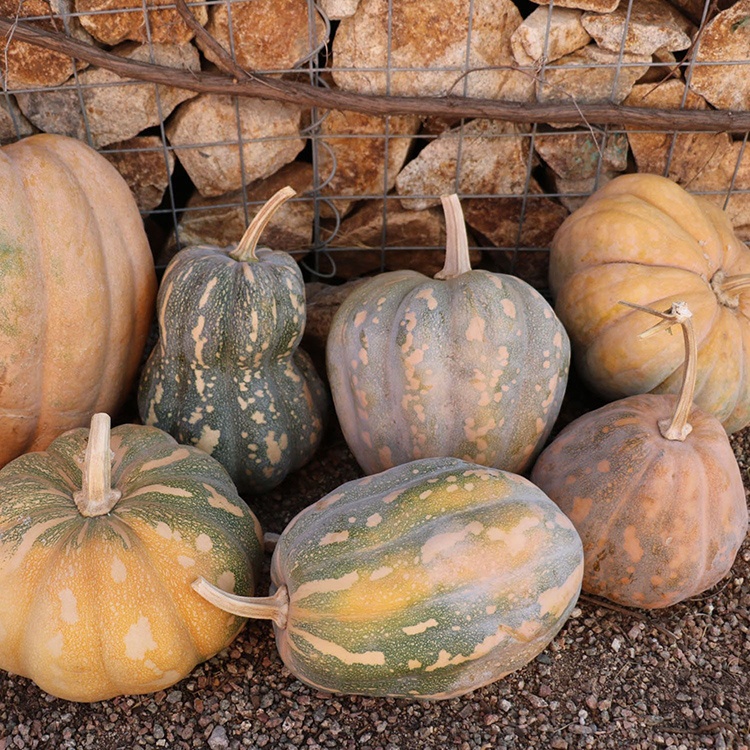
- A nice range of cushaw type squashes. You’ll not find many cushaws in any other catalog.
- A Chihuahuan pumpkin grown above 7000 feet elevation.
- Rancho Marques squash, a southwestern C. moschata variety (same species as butternut, but well-adapted to arid conditions).
For native people accessing the catalog, the collection is much broader. Because of the varied elevation and rainfall in this region, each catalog item specifies where the variety is typically grown. For example, the Rancho Marques squash is grown in desert conditions around 3200′ elevation.
Whether or not you are a gardener, Native Seeds/SEARCH is worth supporting with a donation. Give here. The site also includes a wonderful array of pantry items and gifts from southwestern Native artisans.
Summary: Choose Native Seeds if you are in an arid location, interested in growing unique Native foods, and/or just excited to support a non-profit organization with a great mission.
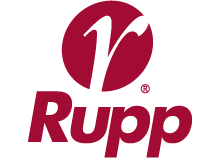
Rupp Seeds
Rupp Seeds is a company that began as a family seed farm in the 1940s, moving from field crops to vegetables in the 1980s under the leadership of Roger Rupp, who grew up on the farm as the youngest of seven kids. The company is based in northern Ohio near the Michigan border, a strongly agricultural area with one of the most predominantly Mennonite populations in the US. I met Roger Rupp a couple of times at vegetable seed industry events before his passing last year—an impressive person who was generous with his advice and always kind.
I chose to highlight Rupp Seeds to include a company of which most home gardeners have no awareness, yet is well known among commercial and market growers. Yet Rupp’s does (like Johnny’s) make smaller packets available as a sideline to its primary business. Rupp’s smallest packets run larger than is typical for home gardener packets, and offer good value per seed. For example, zucchini varieties like ‘golden’ and ‘black’ are sold for $8-$9 per quarter pound, an excellent price if you can find use for that much squash seed (a quarter pound is a lot!). Hybrids are priced much higher than open-pollinated types, even at the smallest packet sizes. Most Rupp seed is sold treated, which organic farmers and gardeners will not prefer.
I also chose to highlight Rupp because of their breeding work. Rupp’s catalog is dominated by standard and latest commercial varieties from the largest vegetable breeders such as Enza Zaden, Sakata, and Seminis. But for a few vegetables, and especially the squashes and pumpkins, Rupp Seeds has a proud history of their own varieties.
Many Rupp-bred varieties are widely sold in other seed catalogs, both large and small. Rupp’s own squash varieties include these among many others:
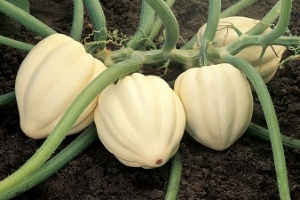
- ‘Cream of the Crop,’ an ivory-colored, open-pollinated AAS-winning acorn squash variety.
- ‘Celebration,’ squash seed for a hybrid gold-and-orange beauty, similar in shape to carnival squash.
- ‘La Estrella,’ a hybrid development from South American calabaza squash types, bred in collaboration with the University of Florida.
- ‘World of Color,’ a beautiful mix of decorative pumpkins such as is increasingly common in fall retail.
There is no online shopping cart for ordering Rupp Seeds. You’ll need to go old school: peruse the pricing in their PDF or print catalog, then either call in your order or mail in a filled out order sheet.
Summary: Choose Rupp Seeds if you’d like to access an exclusive set of squash seed varieties bred by a family-owned company with proud midwestern roots. Or if you have a really big garden and want a good price on medium-sized packets.
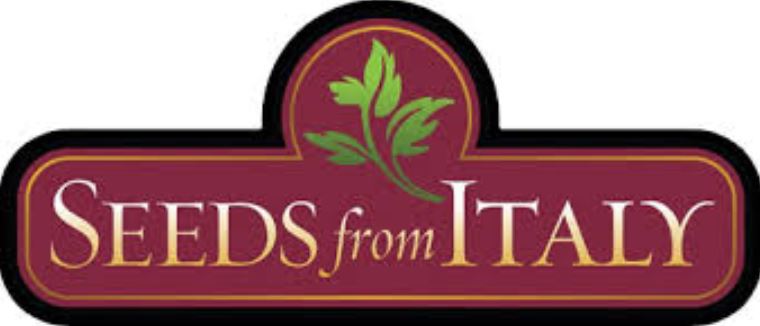
Seeds from Italy
Seeds from Italy, online at growitalian.com, is a Lawrence, Kansas-based distributor of an Italian brand, Franchi, that dates to 1783. I haven’t interacted with this company, but I do have great admiration for the Italian vegetable seed industry. Italian seed packets are the most beautiful and sturdy, and the vegetable varieties are not found elsewhere. Though data aren’t recent, Seeds from Italy has a very strong review history on the Garden Watchdog website.
What I love about Italian vegetables is that they have extremely deep history (preserved by seed savers and by the seed industry for many centuries), and are hyper-specific to certain culinary uses in regional Italian cuisine. Have you ever imagined, for example, that there could be any need for one company to sell 40 varieties of chicory and radicchio of diverse color, shape, and texture? Take a look and be amazed.
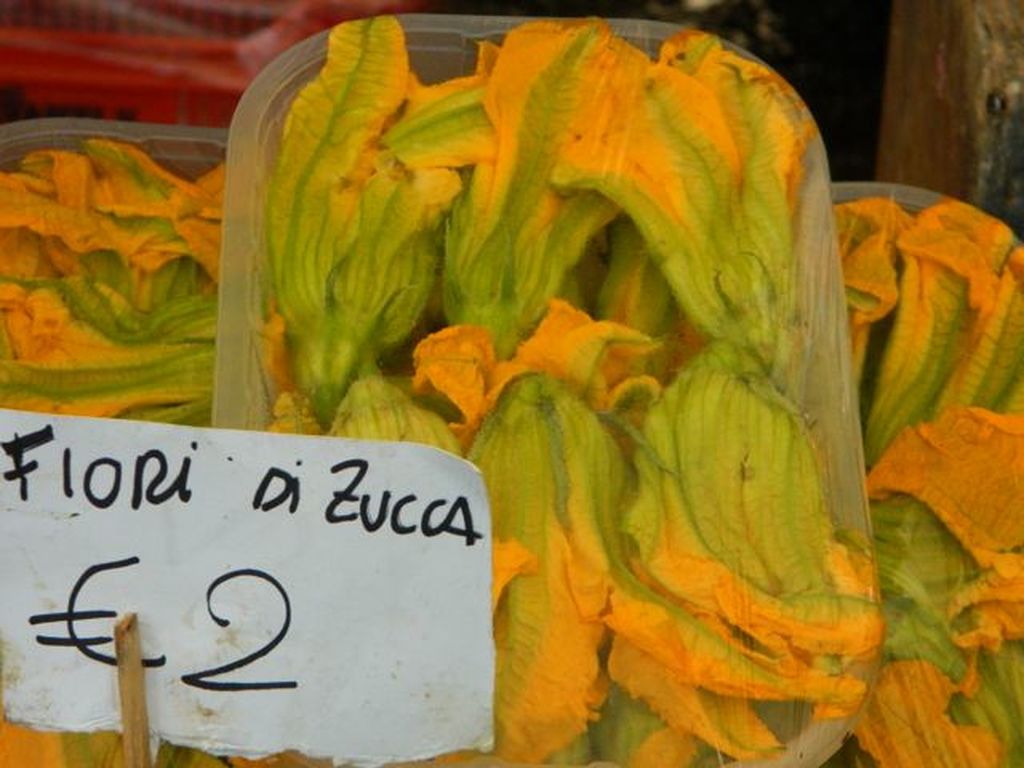
Squash seed is no exception. You’ll find, among others:
- a squash that’s perfect for soup or gnocchi
- a squash traditionally grown for pumpkin jam and preserves, and
- a zucchini bred especially for generous production of edible blossoms.
What could be more fun than that?
Summary: Reading the Seeds from Italy catalog opens a view into the amazing breadth of Italian heirloom gardening and culinary history.
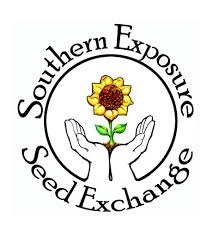
Southern Exposure Seed Exchange
Southern Exposure Seed Exchange was launched as a home-based business by Dr. Jeff McCormack in 1982. I was part of a group that bought SESE and moved it to Acorn Community Farm in 1999, just in time for the Y2K scare-driven seed craze. We had brand new customers who had never gardened before come along and order one of everything in the catalog! I’ve had no financial interest in the company for 18 years now, so I include it here from a pretty unbiased viewpoint of ongoing admiration.
Southern Exposure Seed Exchange focuses on open-pollinated vegetable varieties suited to Southern and Mid-Atlantic gardens and small farms, though people in any region can find something to enjoy in this large catalog.
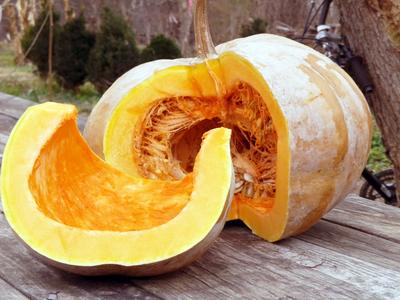
The squash seed collection is strongest and most distinctive for Cucurbita moschata varieties. This makes sense because those of us who garden in the South are especially plagued with squash vine borers, and the different stem morphology of the moschata types makes them resistant to damage from this pest.
Southern Exposure has been instrumental in southern seed preservation, by collecting, maintaining, and introducing heirloom varieties. ‘Upper Ground Sweet Potato‘ squash seed is one good example: this is a family heirloom from Kentucky. SESE has maintained and sold the tasty pest-resistant variety since introducing it to commercial trade in 1988.
Summary: Check out Southern Exposure Seed Exchange if you’re a Southern gardener looking for varieties distinct to the issues faced in the region, if you’re an heirloom gardening fanatic, and/or to learn more about seed saving and historic preservation.
Garden seed catalogs have begun to land in my mailbox. How about yours? What’s your favorite company for buying squash seed or garden seed in general? Tell me in the comments, and note if you prefer to shop for seeds online, or if you still page through the catalog. To me, a good seed catalog is one of those paper objects that just can’t be completely replaced with an online shopping and reading experience.
Come back to see more squash seed posts in coming weeks!
